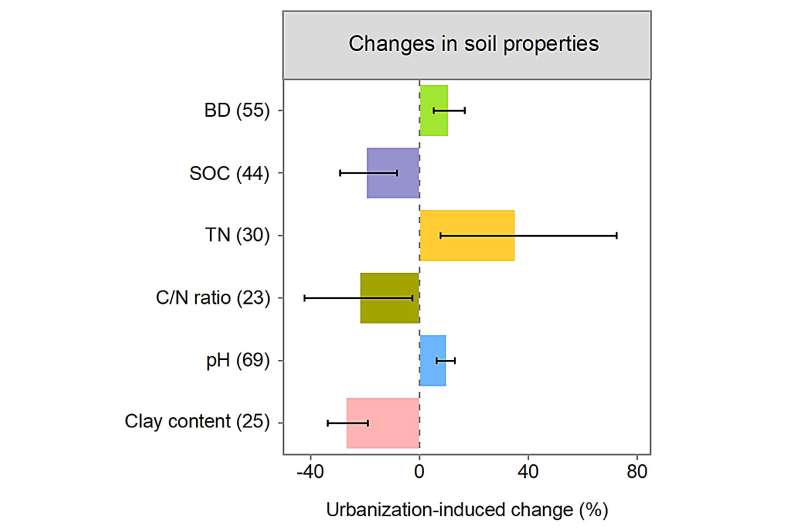This article has been reviewed according to Science X's editorial process and policies. Editors have highlighted the following attributes while ensuring the content's credibility:
fact-checked
peer-reviewed publication
trusted source
proofread
Researchers: Urbanization amplifies climate change through increased soil emissions

Increasing populations and the search for social and economic opportunities are driving people to move from rural to urban areas. Approximately four percent of the global area is urbanized and half of the world's population lives in urban areas. Natural ecosystems are converted into urban landscapes dominated by residential areas with interspersed green areas such as parks or lawns.
"Such conversions affect ecosystem functions and impacts biodiversity, ecosystem services such as provision of clean water as well as the function of such ecosystems as climate regulators," says Professor and Head of Center Klaus Butterbach-Bahl from the Pioneer Center Land-CRAFT at Aarhus University.
In a new study published in Global Change Biology, he and his colleagues shed light on the impact of urbanization on climate change. The study reveals that urban greens are not only sources of greenhouse gas emissions (GHG) but that through altered soil processes the intensity of emissions are increasing. The findings highlight the urgent need to consider sustainable management of urban greens to mitigate effects of urbanization on our climate.
Urbanization can exacerbate climate change
The study delves into the intricate relationship between urbanization, soil GHG emissions, and climate change. The researchers behind the study conducted a comprehensive literature to understand how soil emissions of greenhouse gases, specifically of nitrous oxide (N2O) and methane (CH4), may change due to urbanization.
"Our findings suggest that urbanization significantly affects soil processes and emissions, leading to increased nitrous oxide emissions and reduced methane uptake by soils," Klaus Butterbach-Bahl says.
Nitrous oxide is a potent greenhouse gas, contributing to climate change and stratospheric ozone depletion, while methane is a powerful but short-lived greenhouse gas that has a warming effect. By altering these emissions, urbanization can potentially amplify the adverse impacts of climate change.
Professor Klaus Butterbach-Bahl emphasizes the significance of the research, "Our study shows that urbanization can exacerbate climate change through changes in soil emissions. Urban green areas are hotspots for greenhouse gas emissions, and the transformation of natural landscapes into intensively managed green areas intensifies these effects."
Nature-based solution is one solution
The research highlights several key findings. Firstly, urban soils exhibit significantly higher nitrous oxide emissions compared to rural areas. These emissions are primarily attributed to increased nitrogen deposition, with reactive nitrogen compounds being released during fossil fuel combustion processes and altered soil conditions such as compaction resulting from urban development. Secondly, the conversion of natural land into urban areas reduces the soil's ability to uptake methane, leading to higher atmospheric concentrations of this greenhouse gas.
"The implications of these findings are far-reaching. With rapid urbanization being a global trend, our results underline the urgent need for sustainable urban development and land management practices."
"Efforts should be directed towards implementing sustainable management of urban green spaces such as avoidance of additional fertilizer applications to lawns, promotion of urban agriculture to compensate for loss of agricultural land, and to increase number of trees in urban areas to promote atmospheric CO2 sequestration. These nature-based interventions can help sequester carbon, reduce emissions, and enhance the resilience of urban environments."
Need for sustainable urban planning
The study also provides policymakers and city planners with crucial insights into the environmental consequences of urban expansion. By prioritizing sustainable urban planning, cities can adopt strategies to reduce greenhouse gas emissions, increase carbon sequestration, and enhance overall environmental quality. According to the researchers these efforts will be vital in combating climate change and creating livable cities for future generations.
"There is an urgent need for sustainable urban development practices and the implementation of nature-based solutions. Cities must embrace sustainable practices to curb greenhouse gas emissions, protect our environment, and secure a better future," Klaus Butterbach-Bahl says.
More information: Yang Zhan et al, Urbanization can accelerate climate change by increasing soil N2O emission while reducing CH4 uptake, Global Change Biology (2023). DOI: 10.1111/gcb.16652
Journal information: Global Change Biology
Provided by Aarhus University




















